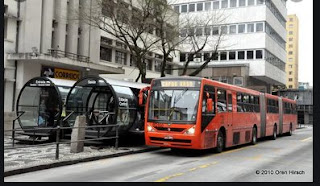As troubling as present problems are, it's encouraging to hear people with much greater limitations than the U.S. are handling them gracefully and well. The following are some stories about just such a place: Curitiba Brazil, a city of nearly two million south and west of Sao Paulo.
Curitiba's mayor, Jaime Lerner, was educated as an architect, and really took the position only because a professional politician in his family couldn't run....so by accident!
In the U.S. the public policy solution is to evict the homeless, and send them walking down the road without their meager possessions, which are often discarded.
Curitiba's mayor, Jaime Lerner, was educated as an architect, and really took the position only because a professional politician in his family couldn't run....so by accident!
Homelessness
Curitiba is poor, and has nearby favelas that house the poorest of its citizens. These are like permanent homeless encampments where the poor settle. As is true in the U.S, sanitation is difficult for the favelas. The access roads and footpaths are too narrow to permit truck access, so the detritus of these communities often makes them unsafe and unsanitary.
Lerner's solution: Sending trucks with bags of food and transit passes. The favela dwellers trade a bag of garbage for a transit pass or bag of food, and the favela gets cleaner.
Unemployment
Poor Curitibans can count on the City to provide job training and apprenticeship programs.
Parks and Flooding
Rather than develop floodplain, Curitiba bought it and turned it into a park. Now it has among the world's highest per-capita parkland acreage.
Curitiba is too poor to afford mowing this area, however. Enter the municipal sheep. The city sells their wool to fund childrens' programs.
Transportation
Despite having favelas, Curitiba is a big city...
...and transportation was a problem. The City is big enough that Brazil's federal government gave Curitiba a grant to implement a subway.
Subways are very expensive, though. They cost about ten times more than light rail, which, in turn, costs about ten times more than bus service, even with dedicated busways.
Lerner's team decided to get one hundred times as much transportation as subways would offer for their money. The problem with bus transit, however, is that you need a driver for each bus. Rail lets you add cars without that driver's salary.
Enter Speedybus, "bus rapid transit"... dedicated busways oversized buses...
Notice that the bus stop/station is an enclosed area, like you might encounter with rail transportation. The bus itself is three buses long, attached with accordion-folded material, so one driver can transport nearly 300 people. The design capacity is 270, but Lerner says Curitibans are "can do" people.
The bus stops are owned by the City, and the City regulates fares, but the buses are privately owned. This system carries millions of passengers, and needs no subsidy.
The passenger-mile cost for fully used bus transit is about one-eighth the cost of single-occupant autos. Curitiba's is one of the most successful mass transit solutions in the world.
Harbor Cleanup
Curitiba is near a harbor which was full of dumped junk. Cleaning it up (so fishing fleets could fish) was going to be very expensive. Instead, the city employed the fishermen in the off season to cast their nets in the harbor and pull up the junk. They got paid per pound, like they did for fish.
Jaime Lerner appeared in Sacramento a few years ago, a guest of "Valley Vision," where he told some of these stories. You can also read them in Natural Capitalism by Amory Lovins and Paul Hawken, and in Bill McGibbon's Hope, Human and Wild.
After he was mayor for a few terms, Lerner became governor of the state (Parana) where Curitiba is located.



No comments:
Post a Comment
One of the objects if this blog is to elevate civil discourse. Please do your part by presenting arguments rather than attacks or unfounded accusations.